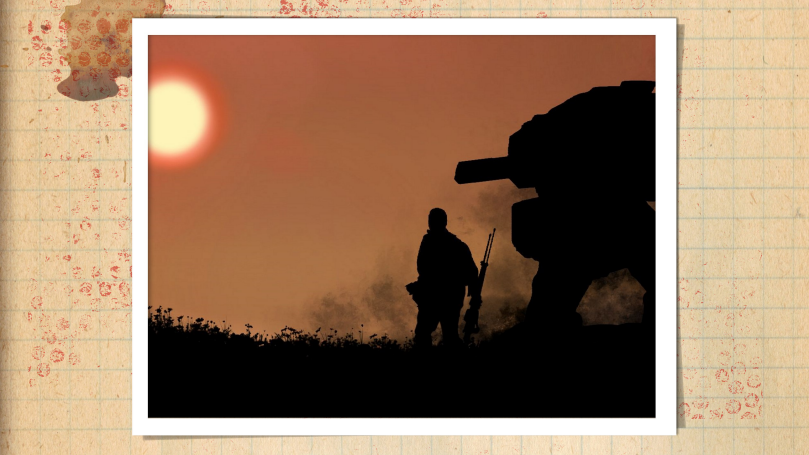A Magic Trick Called Paranoia
Mechs Into Plowshares’ one mechanic managed to hoodwink my ass so good.

We love to metaphorize a big robot, especially one embroiled in war. Stories of massive mecha and the people who pilot them often use hubris and ego, generational trauma, and the corporatization of the military as their foundations — think of Mobile Suit Gundam, Neon Genesis Evangelion, and Macross. But in the solo tabletop RPG, Mechs into Plowshares, your character’s metal counterpart represents both the experience of a battlefield left behind and something more pernicious brought home to fester.
Designed by Anomalous Entertainment Co, Mechs into Plowshares plays similarly to many other solo journaling RPGs, except that the core narrative is intentionally guardrailed. You have returned from a border war after several years away and purchased (via a loan) the mech that saw you through all those horrors so that it can be retrofitted into a tractor on your family farm. Your new, self-appointed mission: Earn enough payments over 10 weeks to pay back the government or lose the mech for good. Acclimate to life after deployment. Contend with ghosts from your past. Stay ever vigilant for the enemy.
Virtually all of the characterization happens via prompts doled amongst 10 weeks of in-game time, each preceded by a bit of narration: “You are a soldier. You were a soldier. You fought for two years along the border,” the text reads before asking: “What Nation did you fight for?” Again, standard fare for journaling games. As the weeks roll by, the player will fill in the sketch of their veteran’s life — before the war, during their tour of duty, and in the present aftermath. Mechanical interaction is brief and sparse, but boy, does it know how to make an impact.
Acclimate to life after deployment. Contend with ghosts from your past. Stay ever vigilant for the enemy.
You play Mechs into Plowshares (in the traditional pull-on-levers-for-results sense) in two ways. First, by gradually overwriting the ten combat subroutines baked into the AI of your mech — and subsequently eliminating the “personality” quirks that accompanied them. The game explicitly states that doing this, replacing fundamental programming with farming software, will make it easier for you to pay your debt. But doing so means eliminating the only tools that might save your life if the enemy ever darkens your doorstep, guns loaded and adversarial mechs hot. If and when you are forced to enter combat, the game explains, the player rolls a d10 and references their subroutine chart. Roll a subroutine you previously crossed out to install a pneumatic fertilizer spreader, or prevent the mech from targeting gophers with its missiles? Dead. Game over. The enemy caught you flat-footed and pants down.
The obvious moral dilemma is still an affecting one. I anguished over wiping just enough of my Gumption’s memory (of course you name it) to keep us both alive and on payment schedule, but not enough to stamp out the supposition, the chance, that a ghost resided in this machine. You are manipulated into caring for that hunk of metal and silicon, a bait I took willingly, which is why I never saw Mechs into Plowshares’ suckerpunch coming.
[Spoilers for the central mechanic of Mechs into Plowshares below. No, seriously: if you want the full effect of discovering this game for yourself, go play it and then come back. It’s like an hour or two, tops.]





